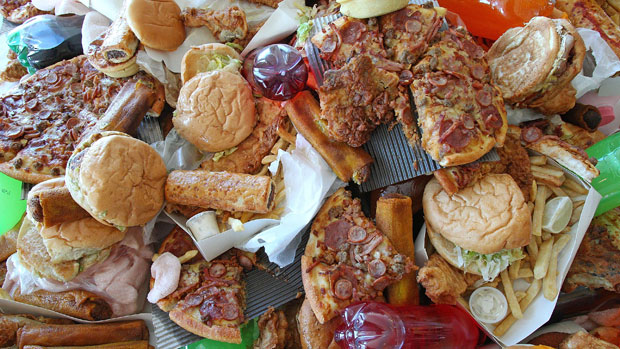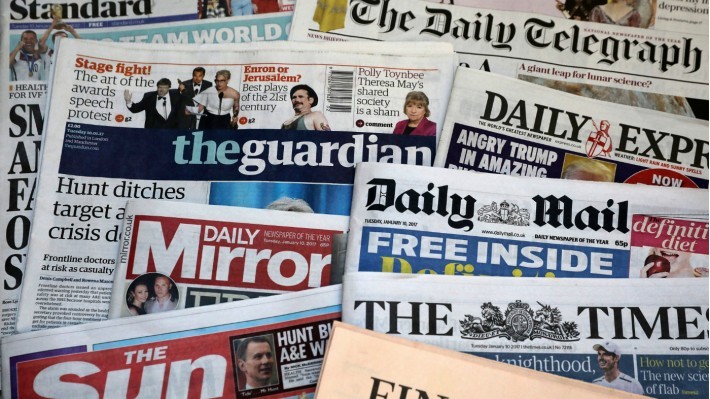Children's online junk food ads banned by watchdog
Committee of Advertising Practice brings print and web in line with TV rules, but campaigners say change is not enough

A free daily email with the biggest news stories of the day – and the best features from TheWeek.com
You are now subscribed
Your newsletter sign-up was successful
Adverts promoting food or drinks high in sugar, fat or salt will be banned on children's non-broadcast media under new rules brought in by the UK's advertising regulator.
Following a public consultation, the Committee of Advertising Practice (CAP) said ads promoting such products can not appear in children's media or other media where children make up more than 25 per cent of the audience.
It believes the new rules will lead to "a significant reduction" in the number of "junk food" ads seen by children on platforms such as YouTube and children's games websites.
The Week
Escape your echo chamber. Get the facts behind the news, plus analysis from multiple perspectives.

Sign up for The Week's Free Newsletters
From our morning news briefing to a weekly Good News Newsletter, get the best of The Week delivered directly to your inbox.
From our morning news briefing to a weekly Good News Newsletter, get the best of The Week delivered directly to your inbox.
Chairman James Best said: "Childhood obesity is a serious and complex issue and one that we're determined to play our part in tackling."
The decision brings standards into line with what is already required for television, says Sky News.
CAP's rules, which come into effect on 1 July 2017, are an attempt to help tackle obesity when children are spending more time online than ever before, says the BBC.
But health organisations say the move doesn't go far enough, with The Guardian reporting that while "cartoon characters and celebrities will be banned from promotional material" for junk foods they will remain on packaging, "meaning they will still be seen on the boxes of sugar-laden breakfast cereals".
A free daily email with the biggest news stories of the day – and the best features from TheWeek.com
The government's childhood obesity strategy was described as "watered down" and "feeble" this summer for not including measures banning the advertising of junk food to children and campaign groups still want the government to take a stronger stance.
Malcolm Clark, the co-ordinator of the Children's Food Campaign, said: "CAP has failed to learn the lessons from industry's exploitation of loopholes in TV advertising regulations.
"Just as many of the TV programmes most watched by children aren't covered by the rules, so it looks like many of the most popular social media sites won't be either; neither will billboards near schools, or product packaging itself."
Action on Sugar agreed, saying it wanted to see bans go further as they "currently do not manage exposure to these adverts during popular family programmes such as The X Factor or Britain's Got Talent".
CAP itself has admitted the health impact of the ban will be modest. "Available evidence shows the effect of advertising on children's food preferences to be relatively small," it said.
-
 The Epstein files: glimpses of a deeply disturbing world
The Epstein files: glimpses of a deeply disturbing worldIn the Spotlight Trove of released documents paint a picture of depravity and privilege in which men hold the cards, and women are powerless or peripheral
-
 Jeff Bezos: cutting the legs off The Washington Post
Jeff Bezos: cutting the legs off The Washington PostIn the Spotlight A stalwart of American journalism is a shadow of itself after swingeing cuts by its billionaire owner
-
 5 blacked out cartoons about the Epstein file redactions
5 blacked out cartoons about the Epstein file redactionsCartoons Artists take on hidden identities, a censored presidential seal, and more
-
 Free app access for The Week’s subscribers during Royal Mail strikes
Free app access for The Week’s subscribers during Royal Mail strikesSpeed Read If you have a subscription to The Week magazine you can read the digital edition on your tablet or phone
-
 Comic Relief to end ‘white saviour’ celebrity trips to Africa
Comic Relief to end ‘white saviour’ celebrity trips to AfricaSpeed Read Charity’s appeal videos described by critics as ‘poverty porn’ and ‘devoid of dignity’
-
 Prince Harry and Meghan Markle to star in ‘fly-on-the-wall’ Netflix reality show
Prince Harry and Meghan Markle to star in ‘fly-on-the-wall’ Netflix reality showSpeed Read Former minister accuses couple of ‘exploiting’ royal links with big-bucks deal
-
 Royal officials to ‘scrutinise’ Prince Harry and Meghan Markle’s $150m Netflix deal
Royal officials to ‘scrutinise’ Prince Harry and Meghan Markle’s $150m Netflix dealSpeed Read Duke and Duchess of Sussex have inked agreement to produce documentaries and films for the streaming service
-
 Prince Harry and Meghan Markle pitch mystery project idea to Hollywood
Prince Harry and Meghan Markle pitch mystery project idea to HollywoodSpeed Read The Sussex royals have been shopping their concept around tinseltown since June
-
 Meghan Markle ‘furious’ over Palace’s failure to defend her ‘against true stories’
Meghan Markle ‘furious’ over Palace’s failure to defend her ‘against true stories’Speed Read Legal documents say she felt unprotected by the royal ‘institution’ - but insiders claim press team were powerless
-
 Ronan Farrow: is Harvey Weinstein’s arch-enemy ‘too good to be true’?
Ronan Farrow: is Harvey Weinstein’s arch-enemy ‘too good to be true’?Speed Read Pulitzer-winning #MeToo journalist rejects New York Times columnist’s allegations of ‘shakiness’ in his work
-
 How coronavirus could shape the news
How coronavirus could shape the newsSpeed Read Trust in journalists is down as newspapers face funding crisis that could reshape media landscape forever